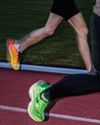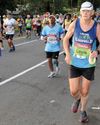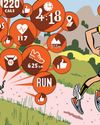
Simple question; complex answer. Made more complex because we neglect to define 'fast appropriately. We tend to think ‘fast' means ‘run like Usain Bolt, or like Joshua Cheptegei, or Dom Scott. But we should think of fast more as 'faster than I am today'.
Which is to say, it's all relative. Understanding this will open up a world of training; and if you can use it to get ‘faster than you are today' often enough, you'll end up fast.
Let's begin by considering what ‘faster' means, from its most basic starting point. To run faster, you either have to take more steps per minute, or each step must be longer. The former means moving your legs faster through the air; the latter means applying more force to the ground to propel you forward. Both require more work by your muscles, and this has a metabolic cost.
But in effect, these are outcomes. In order for either to happen, you need to adapt every system - from your head (literally) to your toes - changing your physiology to allow your muscles to do those two things without incurring a price that's too steep to pay.
So let's consider two extremes of running. On one end is pure speed: you sprint. A training session might consist of 10 repeats of 100m, where you run close to your top speed. If that top speed is a 10 out of 10 (say, you being chased by someone's rabid guard dog), then these runs would be done at 9.5. They're basically all-out sprints, with fairly long rest periods in between.
This story is from the {{IssueName}} edition of {{MagazineName}}.
Start your 7-day Magzter GOLD free trial to access thousands of curated premium stories, and 9,000+ magazines and newspapers.
Already a subscriber ? Sign In
This story is from the {{IssueName}} edition of {{MagazineName}}.
Start your 7-day Magzter GOLD free trial to access thousands of curated premium stories, and 9,000+ magazines and newspapers.
Already a subscriber? Sign In

LONGOVERDUE PRAISE FOR THE RUNNING SINGLET
In the last decade, the running singlet once reserved for amateur competitors and professional athletes - has gone mainstream, not only on race day but also on everyday runs.

RISE OF THE 'ILLEGAL RUNNING SHOES
Banned shoes emerged at a basketball court long before they found their way onto a marathon course.

CRACKING THE SLEEP CODE
Are you an early bird or a night owl? Perhaps you've assigned yourself another animal after completing an internet quiz. Research is shedding light on the link between well-being and circadian predisposition, but there's no need to rewire yourself. Learn to lean into your biology with our guide.

THE SECRET TO SPEED IS IN YOUP BLOOD
Some of the world's best runners credit this unorthodox Norwegian training method for their success. Is it right for you?

THE MIND OF MASSYN
IN 2024, LOUIS MASSYN WILL ATTEMPT HIS 49TH COMRADES MARATHON AND HE'S LEARNT PLENTY OF LESSONS ALONG THE WAY. HERE'S THE STORY OF HIS AMAZING JOURNEY.

TAKING CHARGE
OUTSPOKEN AND AMBITIOUS, NEW COMRADES RACE MANAGER (AND FORMER WINNER) ANN ASHWORTH IS LOOKING TO TAKE THE RACE INTO THE FUTURE.

A HALF CENTURY OF COMRADES
THIS YEAR, BARRY HOLLAND WILL BE AIMING TO FINISH HIS 50TH CONSECUTIVE COMRADES MARATHON. THIS IS WHAT HAS INSPIRED HIM.

MY RUNNING LIFE
ORDINARY RUNNERS doing EXTRAORDINARY THINGS

Ageing In The Age Of Strava
RECENTLY MY BUDDY Sean sent a text message that said, “Been running a lot of 5:30–6:00 kays early. It feels pretty nice at that pace.”

How To Start A Run When You Don't Feel Like It
I'VE ALWAYS FELT validation when reading a story about writers and their love of procrastination.